深圳小学英语五下册知识点总结与练习 unit1
- 格式:doc
- 大小:195.50 KB
- 文档页数:8
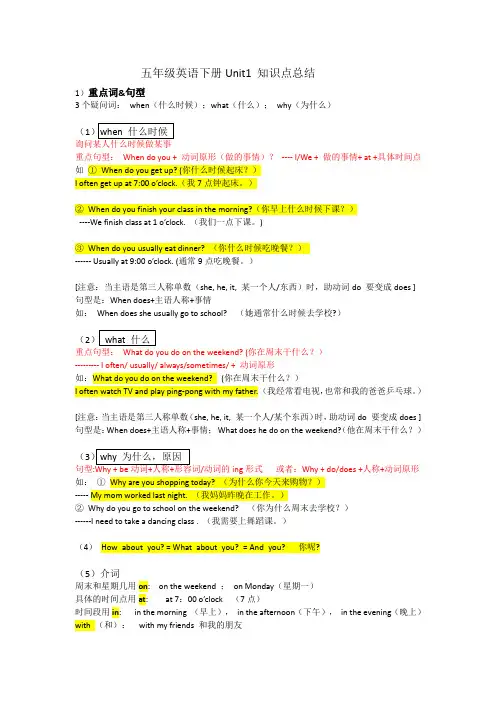
五年级英语下册Unit1 知识点总结1)重点词&句型3个疑问词:when(什么时候);what(什么);why(为什么)(1)when 什么时候询问某人什么时候做某事重点句型:When do you + 动词原形(做的事情)?---- I/We + 做的事情+ at +具体时间点如①When do you get up? (你什么时候起床?)I often get up at 7:00 o’clock.(我7点钟起床。
)②When do you finish your class in the morning?(你早上什么时候下课?)----We finish class at 1 o’clock. (我们一点下课。
)③When do you usually eat dinner? (你什么时候吃晚餐?)------ Usually at 9:00 o’clock. (通常9点吃晚餐。
)[注意:当主语是第三人称单数(she, he, it, 某一个人/东西)时,助动词do 要变成does ]句型是:When does+主语人称+事情如:When does she usually go to school? (她通常什么时候去学校?)(2)what 什么重点句型:What do you do on the weekend? (你在周末干什么?)--------- I often/ usually/ always/sometimes/ + 动词原形如:What do you do on the weekend? (你在周末干什么?)I often watch TV and play ping-pong with my father. (我经常看电视,也常和我的爸爸乒乓球。
)[注意:当主语是第三人称单数(she, he, it, 某一个人/某个东西)时,助动词do 要变成does ]句型是:When does+主语人称+事情;What does he do on the weekend?(他在周末干什么?)(3)why 为什么,原因句型:Why + be动词+人称+形容词/动词的ing形式或者:Why + do/does +人称+动词原形如:①Why are you shopping today? (为什么你今天来购物?)----- My mom worked last night. (我妈妈昨晚在工作。
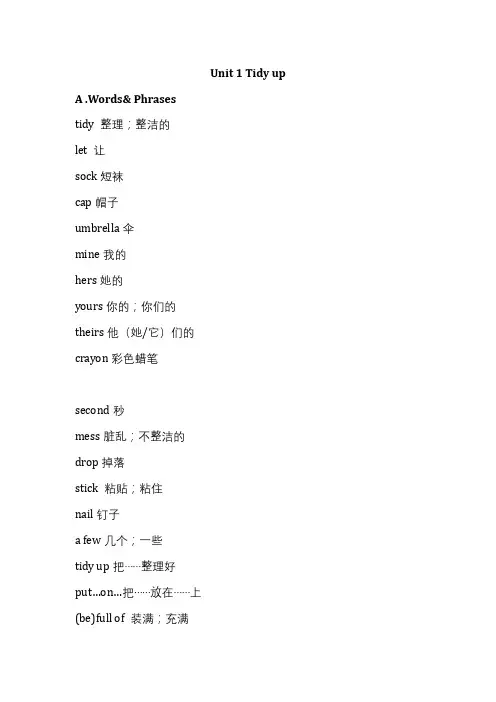
Unit 1 Tidy up A .Words& Phrasestidy 整理;整洁的let 让sock短袜cap帽子umbrella伞mine我的hers她的yours你的;你们的theirs他(她/它)们的crayon彩色蜡笔second秒mess脏乱;不整洁的drop掉落stick 粘贴;粘住nail钉子a few几个;一些tidy up把……整理好p ut…on…把……放在……上(be)full of 装满;充满B. Key Sentences1. ---Are they yours? ---No, they aren’t.---它们是你的吗?---不,它们不是。
2.--- Whose socks are these?--- They’re mine.---这些袜子是谁的?---它们是我的。
C. Language focus1.---Are they yours?---No, they aren’t.yours是名词性物主代词, your是形容词性物主代词。
它们的区别:名词性物主代词相当于一个名词,单独使用,后面不接名词;形容词性物主代词相当于一个形容词,后面要接名词。
两类物主代词的对照表如下:例如:---Are these your books?这些是你的书吗?---No. They are theirs.不,是他们的。
T his is his football. It’s his. 这是他的足球,是他的。
2. They’re Paul’s。
Paul’s是名词所有格形式,表示所属关系,意为“……的”。
其构成形式是: (1)普通单数名词,直接在词尾加“ ’s ”。
如Mary’s book、 the boy’s football(2)以s结尾的复数名词, 在词尾加“ ’ ”。
如 the girls’ dolls.(3)词尾不带s的复数名词,在词尾加“ ’s ”。
如men’s clothes.(4)两人或多人共同拥有的东西,在最后一个名字后面加“ ’s ”。
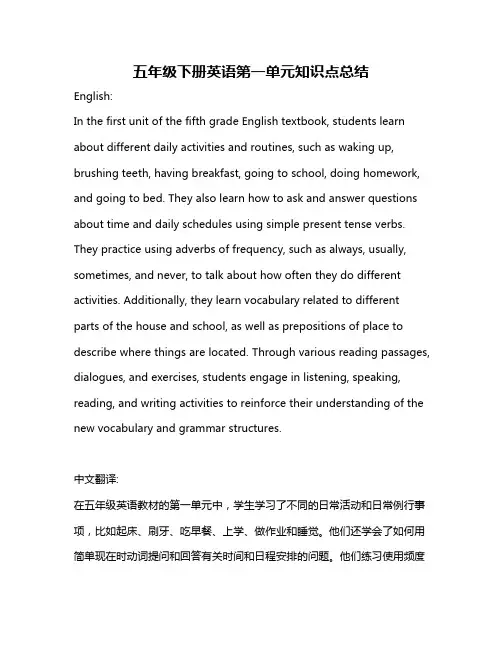
五年级下册英语第一单元知识点总结English:In the first unit of the fifth grade English textbook, students learn about different daily activities and routines, such as waking up, brushing teeth, having breakfast, going to school, doing homework, and going to bed. They also learn how to ask and answer questions about time and daily schedules using simple present tense verbs. They practice using adverbs of frequency, such as always, usually, sometimes, and never, to talk about how often they do different activities. Additionally, they learn vocabulary related to different parts of the house and school, as well as prepositions of place to describe where things are located. Through various reading passages, dialogues, and exercises, students engage in listening, speaking, reading, and writing activities to reinforce their understanding of the new vocabulary and grammar structures.中文翻译:在五年级英语教材的第一单元中,学生学习了不同的日常活动和日常例行事项,比如起床、刷牙、吃早餐、上学、做作业和睡觉。
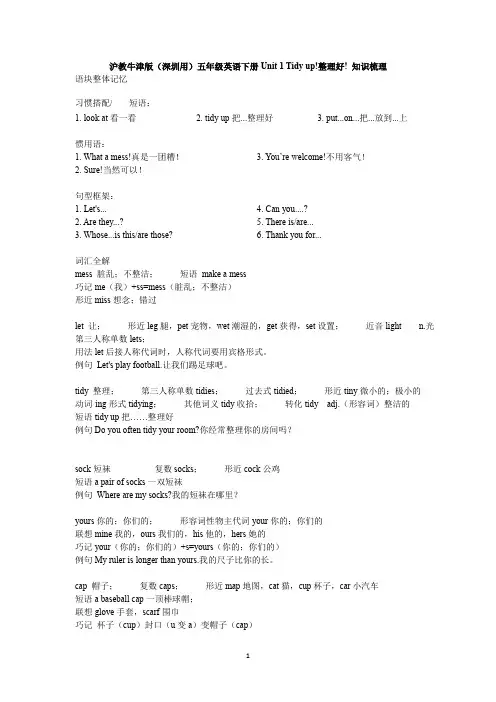
沪教牛津版(深圳用)五年级英语下册Unit 1 Tidy up!整理好! 知识梳理语块整体记忆习惯搭配/短语:1. look at看一看2. tidy up把...整理好3. put...on...把...放到...上惯用语:1. What a mess!真是一团糟!2. Sure!当然可以!3. You’re welcome!不用客气!句型框架:1. Let's...2. Are they...?3. Whose...is this/are those?4. Can you....?5. There is/are...6. Thank you for...词汇全解mess 脏乱;不整洁;短语make a mess巧记me(我)+ss=mess(脏乱;不整洁)形近miss想念;错过let 让;形近leg腿,pet宠物,wet潮湿的,get获得,set设置;近音light n.光第三人称单数lets;用法let后接人称代词时,人称代词要用宾格形式。
例句Let's play football.让我们踢足球吧。
tidy 整理;第三人称单数tidies;过去式tidied;形近tiny微小的;极小的动词-ing形式tidying;其他词义tidy收拾;转化tidy adj.(形容词)整洁的短语tidy up把……整理好例句Do you often tidy your room?你经常整理你的房间吗?sock短袜复数socks;形近cock公鸡短语a pair of socks一双短袜例句Where are my socks?我的短袜在哪里?yours你的;你们的;形容词性物主代词your你的;你们的联想mine我的,ours我们的,his他的,hers她的巧记your(你的;你们的)+s=yours(你的;你们的)例句My ruler is longer than yours.我的尺子比你的长。
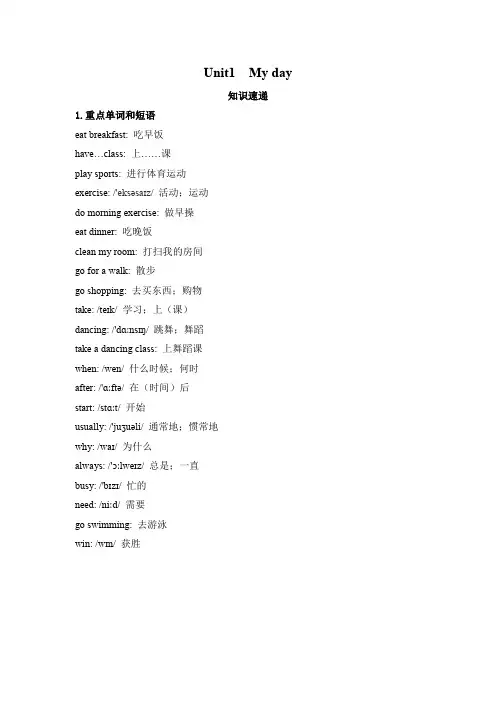
Unit1 My day知识速递1.重点单词和短语eat breakfast: 吃早饭have…class: 上……课play sports: 进行体育运动exercise: /'eksəsaɪz/ 活动;运动do morning exercise: 做早操eat dinner: 吃晚饭clean my room: 打扫我的房间go for a walk: 散步go shopping: 去买东西;购物take: /teɪk/ 学习;上(课)dancing: /'dɑːnsɪŋ/ 跳舞;舞蹈take a dancing class: 上舞蹈课when: /wen/ 什么时候;何时after: /'ɑːftə/ 在(时间)后start: /stɑːt/ 开始usually: /'juʒuəli/ 通常地;惯常地why: /waɪ/ 为什么always: /'ɔːlweɪz/ 总是;一直busy: /'bɪzɪ/ 忙的need: /niːd/ 需要go swimming: 去游泳win: /wɪn/ 获胜2.语法回顾a. 重点单词:eat breakfast, have…class, play sports, exercise, do morning exercise, eat dinner, clean my room, go for a walk, go shopping, take a dancing class, when, usually, why, always, go swimming, win, need.b. 询问何时做某事:When do you……?例:①When do you get up? (你什么时候起床?)②When do you do morning exercises? (你们什么时候做早操?)③When do they go to school? (他们什么时候去上学?)拓展:When does she eat breakfast?练一练:( ) —When______ you do morning exercises?A. doesB. doC. are( ) —When______ she go to bed?A. doesB. doC. arec. 询问他人周末做什么:What do you do on the weekend?例:①What do you do on the weekend? (你周末做什么?)②What does she do on the weekend? (她周末做什么?)回答:①I usually clean my room. (我通常打扫房间。
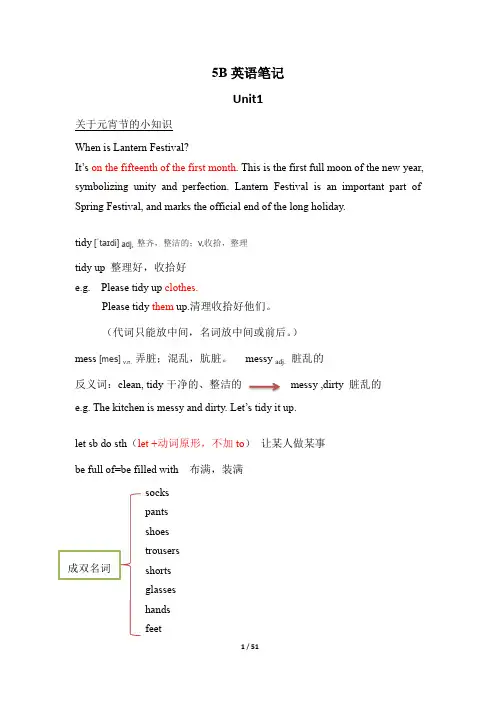
5B英语笔记Unit1关于元宵节的小知识When is Lantern Festival?It’s on the fifteenth of the first month. This is the first full moon of the new year, symbolizing unity and perfection. Lantern Festival is an important part of Spring Festival, and marks the official end of the long holiday.tidy[ˈtaɪdi] adj,整齐,整洁的;v,收拾,整理tidy up 整理好,收拾好e.g. Please tidy up clothes.Please tidy them up.清理收拾好他们。
(代词只能放中间,名词放中间或前后。
)mess [mes] v.n. 弄脏;混乱,肮脏。
messy adj.脏乱的反义词:clean, tidy干净的、整洁的messy ,dirty 脏乱的e.g. The kitchen is messy and dirty. Let’s tidy it up.let sb do sth(let +动词原形,不加to)让某人做某事be full of=be filled with 布满,装满sockspantsshoestrousersshortsglasseshandsfeet成双名词socks [sɑks]袜子yours [jɔ:z] cap [kæp]mine [maɪn] crayon [ˈkreɪən]umbrella [ʌmˈbrelə] nail [neɪl] 钉子,指甲drop [drɒp] v.n.stick [stɪk]n.树枝,木棍,v.粘住,粘贴,坚持stick to1. 秒 e.g. two seconds两秒,a few seconds/ minutes/hours一会2. 第二a few 几个few 几乎没有a little 几个little 几乎没有some/ any一些a lot of =lots of许多e.g. There are many/ some/ a lot of apple s in the fridge(冰箱).There is little bread.We need to buy.We have a few oranges to eat.问:Whose ……is this(近)/ that(远)?答:It’s/ It is …….问:Whose ……are these/ those?答:They’re/ They are…….put on 穿上put …on 把…放上面+可数名词的复数+不可数名词+可数复数名词/不可数名词secondput …in/ under 把……放里面/下面put…away 把……收起来eg. It’s cold. Put on your coat.Please put the socks on your bed.Please put the books in your bag.sththank sb fordoing sth因某事感谢某人e.g. Thank you for helping me.belong to +宾格,“属于”teach sb(宾格)sth,“教某人某物”eg. I teach them English. (I teach their English. ()give sb sth= give sth to sb 给某人某物e.g. give him a block stone= give a black stone to himar [ɑ:] c ar d f ar m st ar t p ar k p ar ty m ar t[ɔ:] w ar w ar m aw ar due [u:] bl ue gl ue cl ue tr ue s ueoo [u:]sch oo l f oo d m oo n n oo n r oo m s oo n c oo l t oo z oo r oo ster ball oo n[ʊ] w oo d g oo d l oo k b oo k f oo t c oo k第一单元重点句子:1. Are they yours?Yes, they are. / No, they aren't.2. Whose socks are these?3. They are mine.4. Is this yours too, peter? No. It's Paul's.5. What a mess!6. Can you put them on his bed?7. All the nails fall on the floor.8. The nails all stick to it.Unit 2Where are they?易错提示:误写成them评讲:在这句里they是主语,而这句是疑问句,就不遵循“宾语放句后”的规则了。
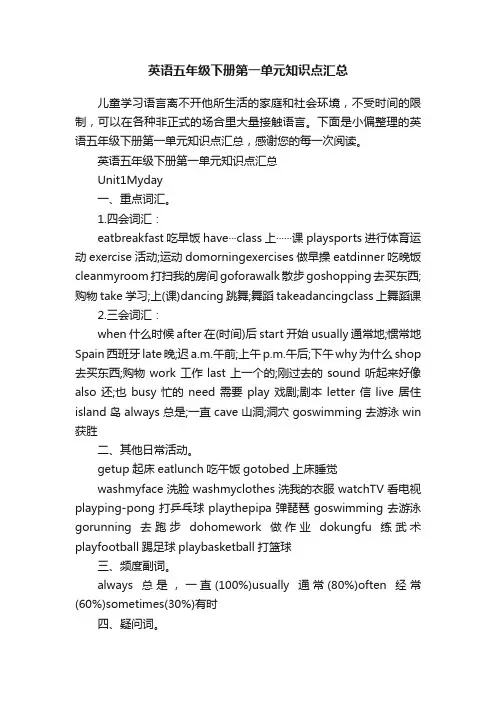
英语五年级下册第一单元知识点汇总儿童学习语言离不开他所生活的家庭和社会环境,不受时间的限制,可以在各种非正式的场合里大量接触语言。
下面是小偏整理的英语五年级下册第一单元知识点汇总,感谢您的每一次阅读。
英语五年级下册第一单元知识点汇总Unit1Myday一、重点词汇。
1.四会词汇:eatbreakfast吃早饭have···class上······课playsports进行体育运动exercise活动;运动domorningexercises做早操eatdinner吃晚饭cleanmyroom打扫我的房间goforawalk散步goshopping去买东西;购物take学习;上(课)dancing跳舞;舞蹈takeadancingclass上舞蹈课2.三会词汇:when什么时候after在(时间)后start开始usually通常地;惯常地Spain西班牙late晚;迟a.m.午前;上午p.m.午后;下午why为什么shop 去买东西;购物work工作last上一个的;刚过去的sound听起来好像also还;也busy忙的need需要play戏剧;剧本letter信live居住island岛always总是;一直cave山洞;洞穴goswimming去游泳win 获胜二、其他日常活动。
getup起床eatlunch吃午饭gotobed上床睡觉washmyface洗脸washmyclothes洗我的衣服watchTV看电视playping-pong打乒乓球playthepipa弹琵琶goswimming去游泳gorunning去跑步dohomework做作业dokungfu练武术playfootball踢足球playbasketball打篮球三、频度副词。
always总是,一直(100%)usually通常(80%)often经常(60%)sometimes(30%)有时四、疑问词。
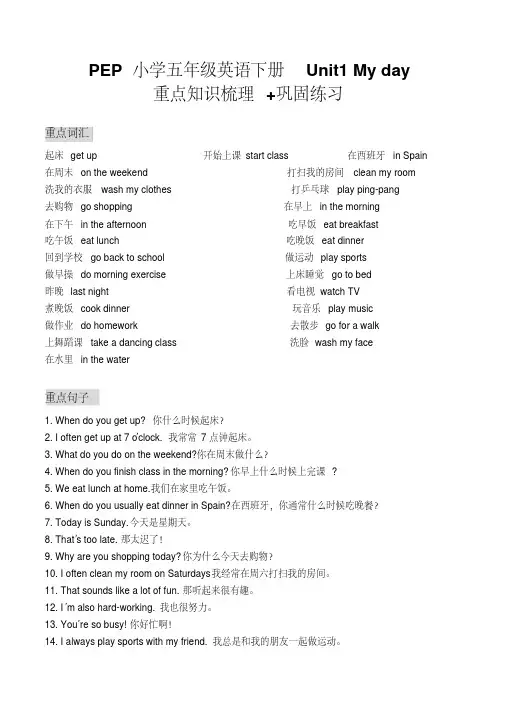
PEP 小学五年级英语下册Unit1 My day重点知识梳理+巩固练习重点词汇起床get up 开始上课start class 在西班牙in Spain 在周末on the weekend 打扫我的房间clean my room 洗我的衣服wash my clothes 打乒乓球play ping-pang去购物go shopping 在早上in the morning在下午in the afternoon 吃早饭eat breakfast吃午饭eat lunch 吃晚饭eat dinner回到学校go back to school 做运动play sports做早操do morning exercise 上床睡觉go to bed昨晚last night 看电视watch TV煮晚饭cook dinner 玩音乐play music做作业do homework 去散步go for a walk上舞蹈课take a dancing class 洗脸wash my face在水里in the water重点句子1. When do you get up? 你什么时候起床?2. I often get up at 7 o’clock. 我常常7点钟起床。
3. What do you do on the weekend? 你在周末做什么?4. When do you finish class in the morning? 你早上什么时候上完课?5. We eat lunch at home. 我们在家里吃午饭。
6. When do you usually eat dinner in Spain? 在西班牙,你通常什么时候吃晚餐?7. Today is Sunday. 今天是星期天。
8. That’s too late. 那太迟了!9. Why are you shopping today? 你为什么今天去购物?10. I often clean my room on Saturdays 我经常在周六打扫我的房间。
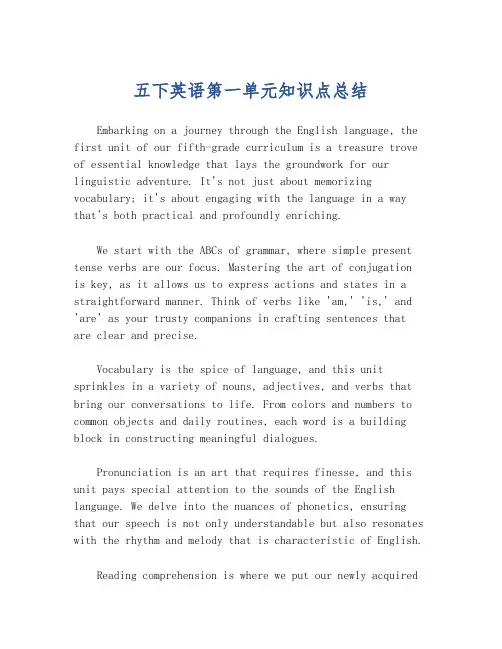
五下英语第一单元知识点总结Embarking on a journey through the English language, the first unit of our fifth-grade curriculum is a treasure trove of essential knowledge that lays the groundwork for our linguistic adventure. It's not just about memorizing vocabulary; it's about engaging with the language in a way that's both practical and profoundly enriching.We start with the ABCs of grammar, where simple present tense verbs are our focus. Mastering the art of conjugationis key, as it allows us to express actions and states in a straightforward manner. Think of verbs like 'am,' 'is,' and 'are' as your trusty companions in crafting sentences that are clear and precise.Vocabulary is the spice of language, and this unit sprinkles in a variety of nouns, adjectives, and verbs that bring our conversations to life. From colors and numbers to common objects and daily routines, each word is a building block in constructing meaningful dialogues.Pronunciation is an art that requires finesse, and this unit pays special attention to the sounds of the English language. We delve into the nuances of phonetics, ensuring that our speech is not only understandable but also resonates with the rhythm and melody that is characteristic of English.Reading comprehension is where we put our newly acquiredskills to the test. Through engaging texts, we learn to extract information, understand context, and infer meanings. It's a skill that's not just academically valuable but also essential for navigating the world beyond the classroom.Finally, we bring it all together with interactive speaking and listening exercises. These are designed to boost our confidence and fluency, ensuring that we can communicate effectively and express ourselves with ease.In summary, the first unit of our fifth-grade English curriculum is a well-rounded introduction to the language, equipping us with the tools necessary to communicate, comprehend, and connect with the world around us. It's an exciting start to a year filled with language exploration and personal growth.。
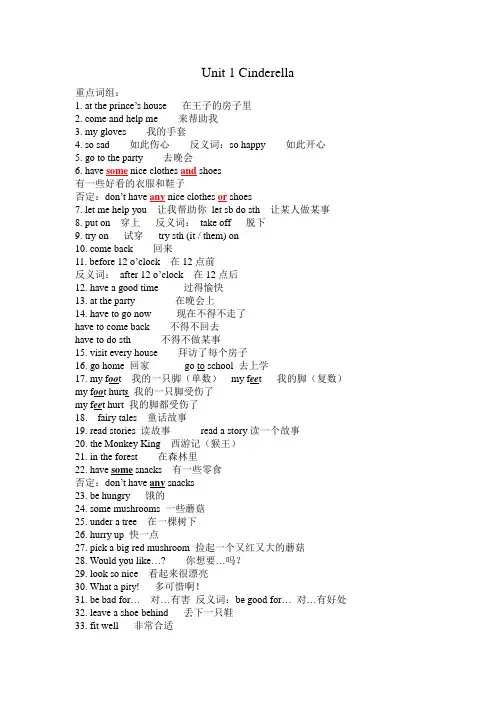
Unit 1 Cinderella重点词组:1. at the prince’s house 在王子的房子里2. come and help me 来帮助我3. my gloves 我的手套4. so sad 如此伤心反义词:so happy 如此开心5. go to the party 去晚会6. have some nice clothes and shoes有一些好看的衣服和鞋子否定:don’t have any nice clothes or shoes7. let me help you 让我帮助你let sb do sth 让某人做某事8. put on 穿上反义词:take off 脱下9. try on 试穿try sth (it / them) on10. come back 回来11. before 12 o’clock 在12点前反义词:after 12 o’clock 在12点后12. have a good time 过得愉快13. at the party 在晚会上14. have to go now 现在不得不走了have to come back 不得不回去have to do sth 不得不做某事15. visit every house 拜访了每个房子16. go home 回家go to school 去上学17. my f oo t 我的一只脚(单数)my f ee t 我的脚(复数)my f oo t hurt s我的一只脚受伤了my f ee t hurt 我的脚都受伤了18. fairy tales 童话故事19. read stories 读故事read a story读一个故事20. the Monkey King 西游记(猴王)21. in the forest 在森林里22. have some snacks 有一些零食否定:don’t have any snacks23. be hungry 饿的24. some mushrooms 一些蘑菇25. under a tree 在一棵树下26. hurry up 快一点27. pick a big red mushroom 捡起一个又红又大的蘑菇28. Would you like…? 你想要…吗?29. look so nice 看起来很漂亮30. What a pity! 多可惜啊!31. be bad for…对…有害反义词:be good for…对…有好处32. leave a shoe behind 丢下一只鞋33. fit well 非常合适语法:知识点1: Why?Because I can’t go to the party.Why为什么回答用Because。
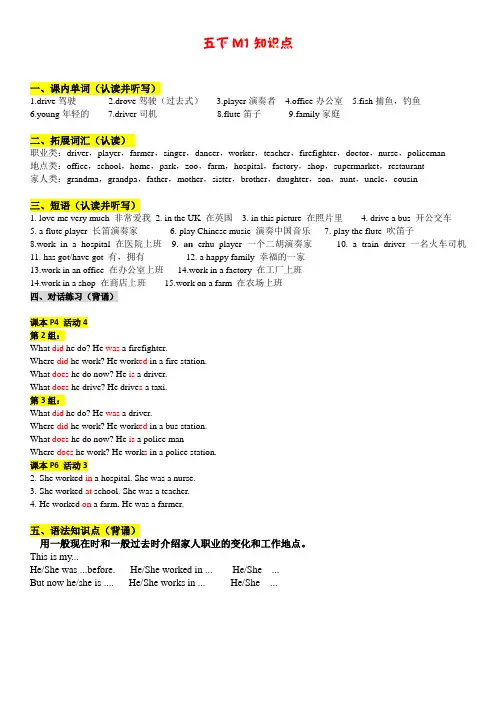
五下M1知识点一、课内单词(认读并听写)1.drive驾驶2.drove驾驶(过去式)3.player演奏者4.office办公室5.fish捕鱼,钓鱼6.young年轻的7.driver司机8.flute笛子9.family家庭二、拓展词汇(认读)职业类:driver,player,farmer,singer,dancer,worker,teacher,firefighter,doctor,nurse,policeman地点类:office,school,home,park,zoo,farm,hospital,factory,shop,supermarket,restaurant家人类:grandma,grandpa,father,mother,sister,brother,daughter,son,aunt,uncle,cousin三、短语(认读并听写)1. love me very much 非常爱我2. in the UK 在英国3. in this picture 在照片里4. drive a bus 开公交车5. a flute player 长笛演奏家6. play Chinese music 演奏中国音乐7. play the flute 吹笛子8.work in a hospital 在医院上班9.an erhu player一个二胡演奏家10. a train driver 一名火车司机11. has got/have got 有,拥有12. a happy family 幸福的一家13.work in an office 在办公室上班14.work in a factory 在工厂上班14.work in a shop 在商店上班15.work on a farm 在农场上班四、对话练习(背诵)课本P4 活动4第2组:What did he do? He was a firefighter.Where did he work? He work ed in a fire station.What does he do now? He is a driver.What does he drive? He drive s a taxi.第3组:What did he do? He was a driver.Where did he work? He work ed in a bus station.What does he do now? He is a police manWhere does he work? He work s in a police station.课本P6 活动32.She worked in a hospital. She was a nurse.3.She worked at school. She was a teacher.4.He worked on a farm. He was a farmer.五、语法知识点(背诵)用一般现在时和一般过去时介绍家人职业的变化和工作地点。
5下Unit1知识点整理(译林版)【词汇】prince 王子 fairy 仙女because 因为 late 迟的,晚的clothes 衣服let 让 try on 试穿have to 不得不,必须put on 穿上 fit 合适,合身 take off 脱下before 在......以前why 为什么pick 摘,拾mushroom 蘑菇understand 明白,理解be bad for 有害的 leave ...behind留下,丢下【词组或短语】1. at the prince’s house 在王子的宫殿e and help me 过来帮我3. my gloves 我的手套4.so sad 如此伤心5. put on the new clothes and shoes 穿上新衣服和鞋子6. come back 回来7.before 12 o’clock 在12点前8. have a good time 玩得开心9.at the party 在派对上10. have to go 不得不走11.visit every house 拜访每一间屋子12. try on the shoe 试穿鞋子13.fairy tales 童话故事14. remember these question words 记得这些提问词15. Monkey King美猴王16.have a drink喝一杯17. draw a dress画一条连衣裙18.have some snacks吃一些零食19. in the forest 在森林里20.find some mushrooms找到一些蘑菇21. hurry up 快点22.look so nice 看起来如此漂亮23. pick a big and red mushroom 采到一颗又大又红的蘑菇24. don’t understand 不理解25.be bad for 对…有害26. What a pity! 真可惜!27.take off 脱下28. put on his jacket 穿上他的夹克衫29.take off her coat 脱下她的外套30. go to the party 去参加聚会31.my foot hurts 我的脚疼32. under a tree 在树下33.all the girls 所有的女孩34. leave a shoe behind 丢下了一只鞋35. fit well 正合适。
牛津英语深圳版五年级下第一单元知识点复习Unit 1 Tidy up! 【词组】1.tidy … (代词) up / tidy up …(名词) 整理好,收拾好clean up 打扫干净,清理干净clear up 清理,整理tidy 整理,使整洁,使有条理(动词);整齐的,整洁的(形容词)clean 打扫(动词);干净的(形容词)clear 清理(动词);明白清楚的(形容词)tidy, clean, clear都是既可以作动词,又可以作形容词。
2. put …(代词) on 把…放在…上面;put on 穿上,戴上3.clean and tidy 又干净又整洁4.thank you for …感谢…5. in pairs 成对的,成双的6. be full of …装满,充满7. all the …所有的…8. fall on the floor 掉在地上9. give sb.(某人) sth.(某物) = give sth. to sb. 给某人某物10. put … near…把…放在…旁边11.stick … to …粘住12. in a few seconds 一会儿后,几秒后 in + 一段时间表示“…久之后”a few + 可数名词复数表示“几个;一些”【句型】1.What a mess! 真是一团糟啊!2.--Whose socks are those? 那些是谁的袜子?--They are Paul’s. 他们是Paul的。
--Whose cap is this? 这是谁的帽子?--It’s mine. 它是我的。
3. --Are they yours? 他们是你的吗?--No, they aren’t. 不,不是。
4. --Is this yours too? 这也是你的吗?--No. It’s Paul’s. 不,它是Paul的。
5. --Can you put it / them on his bed? 你可以把它/它们放在他的床上吗?--Sure. 当然。
Unit 1重点知识一、单词prince王子princess公主stepmother继母stepsister异父母姐妹fairy仙女why为什么because因为fit合适tale小说snack零食find找到mushroom蘑菇pick摘,捡understand理解bad坏的,不好的leave留下,离开pity可惜clothes衣服hurt受伤newspapers报纸二、词组at the prince’s house在王子的家help me帮我help sb帮某人go to the party去宴会nice clothes漂亮的衣服put on穿上take off脱掉come back回来before 12 o’clock在12点之前have a good time 过得愉快have a lot of fun有许多趣事at the party在宴会上have to 不得不have to do sth不得不做某事visit every house访问每一家many girls许多女孩try sth on= try on sth试穿某物try on the shoe= try the shoe on试穿这只鞋try it on试穿它try them on 试穿它们fit sb适合某人read fairy tales读童话故事have some snacks有一些零食find sth 找到某物find some mushrooms找到一些蘑菇find my shorts 找到我的短裤hurry up快点pick up捡起pick a big peach 摘了一个大桃子look so nice看起来好看的so happy如此高兴leave sth behind把某物留下leave a shoe behind把一只鞋丢下be bad for对…有害be good for对..有益fit well很合身三、句子1. There is a party at the prince’s house.在王子家有个派对。
五年级下册Unit 1 Tidy upⅠ单元基础知识(每周会进行听、说、背的考察,并记录表格)【沙场点兵】选择适当的短语,完成对话,注意大小写1. —Please your bedroom, Tom. You should keep it clean. —Ok, mom.2. —are these? Are they yours, May?—They aren’t mine. They are Kitty’s.3. —Be careful, Lisa. The bottle is hot water.—Ok, I know. Thank you, Sally.4. —Look, there are boys in the playground.—Yes, they are playing basketball there.Ⅱ 知识详解[词汇全解]1. tidy 整理;整洁的 【原文链接】Look at your bedroom. What a mess! Let ’s tidy it up .看看你的卧室,多脏啊!让我们一起打扫干净。
【复习】动词原形或三单形式【小试牛刀】写出下列动词的第三人称单数形式和ing 形式。
1. go________ ________2. stop ________ ________3. move________ ________4. carry ________ ________5. draw________ ________6. swim ________ ________7. stay ________ ________8.tidy________ ________9. watch________ ________ 10. let ________ ________2. let 的用法 使役动词:“让”【原文链接】Let ’s tidy it up. 让我们来整理干净吧!【固定搭配】L et+动词原形 e.g. There are too many books, you can let Peter help you. 书太多了,你可以叫Peter 帮你。
Let+人称代词宾格+动原 e.g. Let me help you clean the classroom.注意:let ’s = let us 让我们 e.g. Let ’s go to school together. 让我们一起去学校。
【拓展】 动词原形情况一般现在时谓语动词三单变化规则:1. 一般直接在单词之后加s 如:speak s , talk s, see s , look s2. 以-s,-x,sh,-ch 及-o 结尾的词加es 如:do es, watch es , wash es ...3. 以“辅音字母+y ”结尾的词,变y 为i 再加es 如:stud ies, fl ies ...4. 以“元音字母+y ”结尾 w 的词,直接加s 如:play s , stay s5. 不规则变化:be —is , have —has作动词:整理;收拾;整理干净 e.g. Do you often tidy your bedroom? tidy= clean作形容词:整洁的;干净的 e.g. This classroom is very tidy !反义词:tidy 整洁的—untidy 不整洁的 tidy 整洁的—messy 脏乱的 三单形式:tidy —tidiese.g. Peter often tidies his desk after school. Peter 经常放学后整理他的书桌。
【固定搭配】 tidy up 把...整理好 (注意: tidy+代词/名词+up ) e.g. Let ’s tidy the bedroom up together. 让我们一起把卧室整理干净。
+动原动词+ing情况①like 喜欢/ love 爱/ enjoy 享受+ 动词inge.g. I enjoy playing the piano in my spare time. 在我空闲时,我很喜欢弹钢琴。
②be good at+ 动词ing “擅长做…”e.g. I like running, but I am not good at swimming. 我喜欢跑步,但是我不擅长游泳。
③stop+动词ing “停止做…”e.g. Please stop making noise. 请停止制造噪音。
④go+ 动词ing e.g. I will go shopping with my mother tomorrow.⑤介词for、about、at、in后的动词需用ing形式。
e.g. How about swimming?【牛刀小试】1).I can ______ (jump) but Amy can’t _________ (run).2).I like ________ (swim) and I want to be a _________ (swim). I will _________ (swim) this weekend.3).If you enjoy ___________ (help) people, you can be a policeman.4).I am good at_________ (sing). Let’s _________ (sing) together now.5).You need__________ (help) your mother _________ (clean) the room on weekends.6).Are you ___________(do) sports now?7).Amy likes _________ (play) the piano. She does n t always___________ (play) the piano on Monday.8) It’s red light now, please stop(walk).9)Little chick wants to be a lifeguard but it is afraid of(swim).10)Today is a sunny day, let’s go(fish) and have a picnic.3.【复习】cloth服装类单词【原文链接】Whose socks are these? 这些是谁的袜子?Whose cap is this? 这是谁的帽子?注意:衣物复数①由两部分构成的单件事物名词。
如trousers(裤子), scissors(剪刀), glasses(眼镜), Jeans(牛仔裤), shorts(短裤) 等。
e.g. My father wears a pair of glasses. 我爸爸戴一副眼镜。
②后面可以接包括两件东西且习惯上一起使用的名词,如shoes(鞋子),boots(靴子),socks(袜子),gloves(手套),chopsticks(筷子)等等。
e.g. Alice has a pair of gloves.Alice 有一双手套。
4.【时间表达】【原文链接】In a few seconds, the floor is clean again. 一会儿后,地板就干净了。
【复习】hour 小时minute 分钟second 秒固定搭配:half an hour 半小时wait a minute/ second / minute 等一会in a few seconds 一会过后e.g. Can you give me five minutes? I have a little homework to do.你能给我五分钟吗?我还有一点作业没做。
【复习】序数词第一至第十第十一至第十九第二十至第九十缩写第一first 1st第二second 2nd 第三third 3rd 第四fourth 4th 第五fifth 5th第六sixth 6th 第七seventh 7th第八eighth 8th第九ninth 9th 第十tenth 10th缩写第十一eleventh 11th第十二twelfth 12th第十三thirteenth 13th第十四fourteenth 14th第十五fifteenth 15th第十六sixteenth 16th第十七seventeenth 17th第十八eighteenth 18th第十九nineteenth19th缩写第二十twentieth 20th第三十thirtieth 30th第四十fortieth 40th第五十fiftieth 50th第六十sixtieth 60th第七十seventieth 70th第八十eightieth 80th第九十ninetieth 90th基变序有规律,结尾字母th。
一二三特殊记,结尾字母tdd。
八去t, 九去e, f要把ve替。
ty将y变成i, th前面有个e。
几十几也好记只变个位就可以。
【牛刀小试】四、选择填空。
( )1.We go to the market at five______twelve in the afternoon.A.toB.tooC.pastD.pass( )2.Sunday is ______day of the week.A.OneB.the oneC.firstD.the first( )3.I will be back in______.A.Half a hourB.a hourC.a hour and halfD.half an hour( )4.There are______days in a week.Today is the______day of the week.A.seventh;sevenB.seven;seventhC.seven;sevenD.seventh;seventh( )5. My cousin’s birthday in on the of October.A. threeB. firstC. the second( )6. What date is it today? It’s of April.A. twelfthB. the 12thC. 12th( )7. There are days in a week.A. the sevenB. seventhC. the seventhD. seven( )8.Sunday is the day of a week.A. oneB. firstC. second5.【数量词】a few, a little的区别①【a few】用于修饰可数名词。